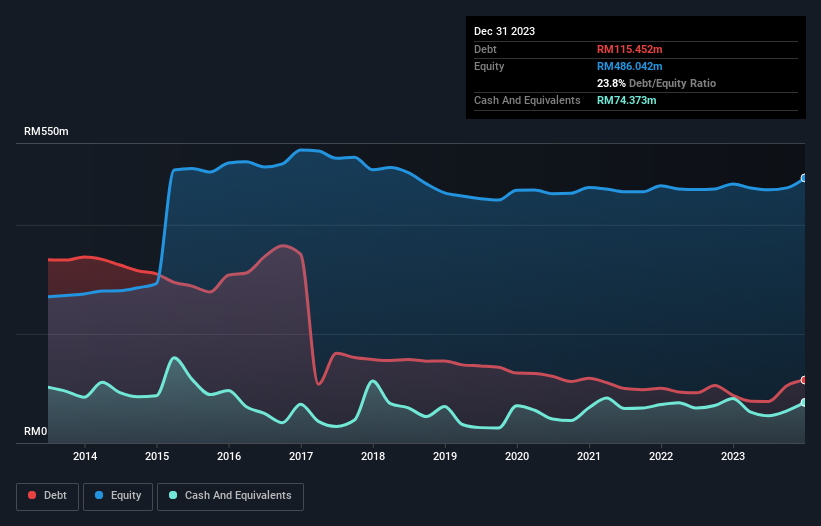
Howard Marks put it nicely when he said that, rather than worrying about share price volatility, 'The possibility of permanent loss is the risk I worry about... and every practical investor I know worries about.' It's only natural to consider a company's balance sheet when you examine how risky it is, since debt is often involved when a business collapses. Importantly, Bina Darulaman Berhad (KLSE:BDB) does carry debt. But should shareholders be worried about its use of debt?
What Risk Does Debt Bring?
Debt and other liabilities become risky for a business when it cannot easily fulfill those obligations, either with free cash flow or by raising capital at an attractive price. Ultimately, if the company can't fulfill its legal obligations to repay debt, shareholders could walk away with nothing. However, a more usual (but still expensive) situation is where a company must dilute shareholders at a cheap share price simply to get debt under control. Of course, the upside of debt is that it often represents cheap capital, especially when it replaces dilution in a company with the ability to reinvest at high rates of return. The first step when considering a company's debt levels is to consider its cash and debt together.
See our latest analysis for Bina Darulaman Berhad
What Is Bina Darulaman Berhad's Net Debt?
You can click the graphic below for the historical numbers, but it shows that as of December 2023 Bina Darulaman Berhad had RM115.5m of debt, an increase on RM87.5m, over one year. However, it also had RM74.4m in cash, and so its net debt is RM41.1m.

A Look At Bina Darulaman Berhad's Liabilities
The latest balance sheet data shows that Bina Darulaman Berhad had liabilities of RM245.4m due within a year, and liabilities of RM67.7m falling due after that. Offsetting this, it had RM74.4m in cash and RM140.1m in receivables that were due within 12 months. So its liabilities total RM98.7m more than the combination of its cash and short-term receivables.
This is a mountain of leverage relative to its market capitalization of RM123.1m. This suggests shareholders would be heavily diluted if the company needed to shore up its balance sheet in a hurry.
We measure a company's debt load relative to its earnings power by looking at its net debt divided by its earnings before interest, tax, depreciation, and amortization (EBITDA) and by calculating how easily its earnings before interest and tax (EBIT) cover its interest expense (interest cover). This way, we consider both the absolute quantum of the debt, as well as the interest rates paid on it.
Bina Darulaman Berhad's net debt to EBITDA ratio of about 1.9 suggests only moderate use of debt. And its strong interest cover of 23.5 times, makes us even more comfortable. Notably Bina Darulaman Berhad's EBIT was pretty flat over the last year. We would prefer to see some earnings growth, because that always helps diminish debt. There's no doubt that we learn most about debt from the balance sheet. But it is Bina Darulaman Berhad's earnings that will influence how the balance sheet holds up in the future. So if you're keen to discover more about its earnings, it might be worth checking out this graph of its long term earnings trend.
Finally, while the tax-man may adore accounting profits, lenders only accept cold hard cash. So we always check how much of that EBIT is translated into free cash flow. Over the most recent three years, Bina Darulaman Berhad recorded free cash flow worth 75% of its EBIT, which is around normal, given free cash flow excludes interest and tax. This cold hard cash means it can reduce its debt when it wants to.
Our View
Bina Darulaman Berhad's interest cover was a real positive on this analysis, as was its conversion of EBIT to free cash flow. On the other hand, its level of total liabilities makes us a little less comfortable about its debt. Considering this range of data points, we think Bina Darulaman Berhad is in a good position to manage its debt levels. But a word of caution: we think debt levels are high enough to justify ongoing monitoring. The balance sheet is clearly the area to focus on when you are analysing debt. However, not all investment risk resides within the balance sheet - far from it. Be aware that Bina Darulaman Berhad is showing 3 warning signs in our investment analysis , you should know about...
If, after all that, you're more interested in a fast growing company with a rock-solid balance sheet, then check out our list of net cash growth stocks without delay.
Valuation is complex, but we're here to simplify it.
Discover if Bina Darulaman Berhad might be undervalued or overvalued with our detailed analysis, featuring fair value estimates, potential risks, dividends, insider trades, and its financial condition.
Access Free AnalysisHave feedback on this article? Concerned about the content? Get in touch with us directly. Alternatively, email editorial-team (at) simplywallst.com.
This article by Simply Wall St is general in nature. We provide commentary based on historical data and analyst forecasts only using an unbiased methodology and our articles are not intended to be financial advice. It does not constitute a recommendation to buy or sell any stock, and does not take account of your objectives, or your financial situation. We aim to bring you long-term focused analysis driven by fundamental data. Note that our analysis may not factor in the latest price-sensitive company announcements or qualitative material. Simply Wall St has no position in any stocks mentioned.
About KLSE:BDB
Bina Darulaman Berhad
An investment holding company, engages in the oil palm plantation, property development, and management service businesses in Malaysia.
Excellent balance sheet low.
Market Insights
Community Narratives



